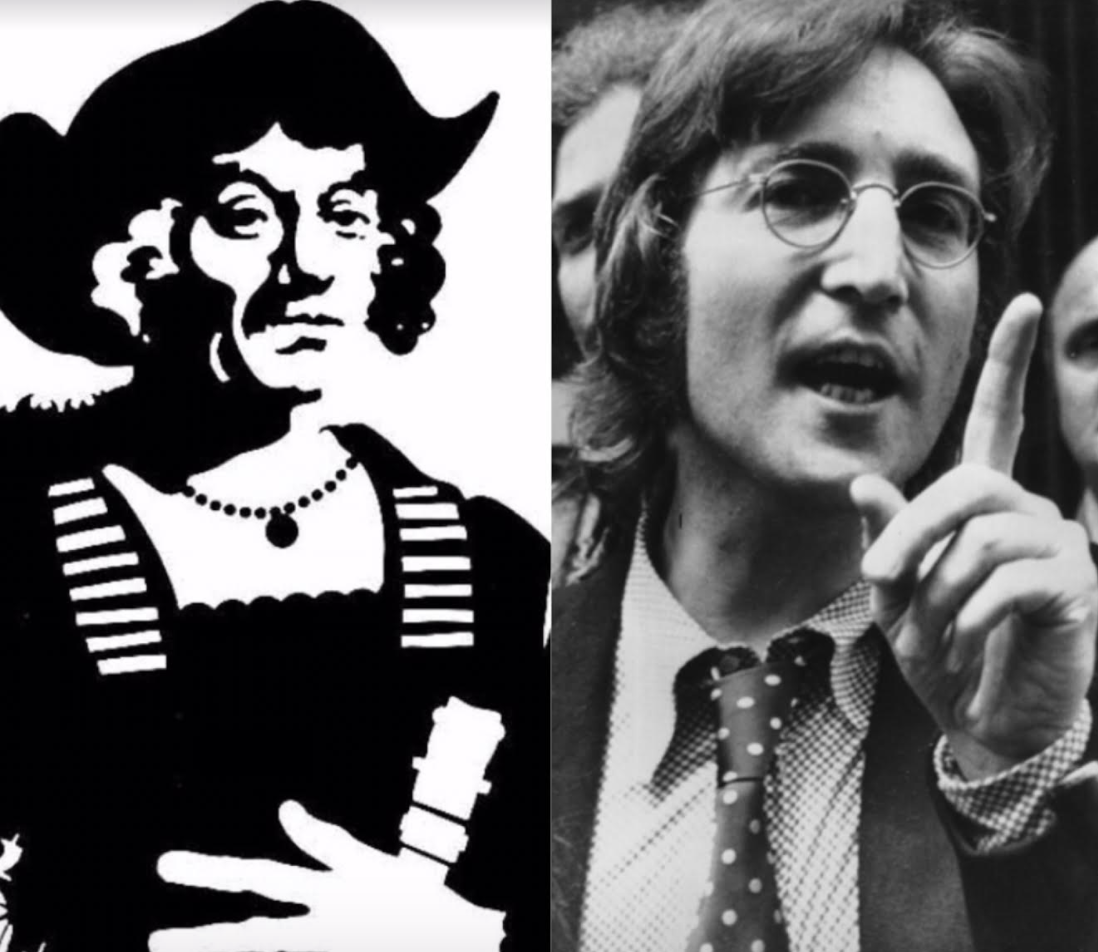Every so often the birthday of John Lennon will fall on the same day as Columbus Day–or what many insist should unanimously be called Indigenous Peoples Day. Both men are New York institutions, with Lennon’s fight to stay in New York City as a permanent resident legendary among fraught immigration cases (read John Lennon vs. The U.S.A.) and Columbus an emblem of the Italian American population throughout the five boroughs. That Lennon simply happened to come at a time when the U.S. had seemingly dispensed with its original, Columbus-like notions of “everyone who comes here shall be allowed to plunder” is in ironic contrast to the so-called “Father of America’s” experience.
Represented by Leon Wildes, Lennon’s immigration case marked a new precedent in legal history as Wildes ultimately invoked the Freedom of Information Act to prove his theory that the government allowed extenuating circumstances for certain immigrants living illegally in the U.S. Now known as prosecutorial discretion, the term highlights the federal government’s inability to, in actuality, deport all immigrants based on legality alone. Once files revealed that the Nixon administration expressly did not want Lennon present in the U.S. as a result of his “peacenik” ways and the influence he had over the youth, it became clear that Lennon was being blatantly discriminated against. Subsequently and as a direct result of this case, immigrants, which Columbus long ago proved are the backbone of this country, can remain due to “sympathetic circumstances.” Wildes findings would, indeed, form the crux of Barack Obama’s deferred action policy. And here John wasn’t even trying to usurp any indigenous people’s property–other than maybe the stuffy twats living on the Upper West Side.
Where Lennon and Columbus share a sort of inverse connection (apart from their divergent abilities to immigrate to America) is that Lennon is a man who acted egregiously in his personal life, yet is deified because of the message of his music. Conversely, Columbus is a man vilified for his personal views, discriminations and life, therefore his achievements are given further license to be cast aside. However, from the perspective of historical value, there can be no denying Columbus’ indispensability to the course of the U.S.’ formation, for it was he who solidified, after four voyages to the “New World,” European settlement in Hispaniola and beyond, signaling the embryonic population change that would eventually create the United States.
It seems strange, in many respects, that so many men are allowed the luxury of continued reverence if the work they contribute to the world is deemed genius (this is why Bill Cosby couldn’t get out of his comeuppance, for The Cosby Show most definitely doesn’t bear the mark of brilliance so much as blazing a trail for de-whiteifying the TV airwaves). Woody Allen, Roman Polanski and R. Kelly (though the other shoe on his urine-soaked bed could drop any day) are also men who have persisted in evading collective condemnation because their art is considered too valuable.
Lennon was a philanderer, a negligent father (at least to Julian), an opportunist (see: capitalizing on Brian Epstein’s gay love for him) and an Asian woman fetishist (May Pang and Yoko Ono a fetish make). These, of course, are the facts that led Mark David Chapman to target him as a phony baloney as per Holden Caulfield’s rules of existence. But because Lennon was always classified as a great artist in his lifetime and beyond, all of these foibles–to use understatement–were and are forgiven. Columbus–and, most recently Harvey Weinstein–cannot be allowed the opportunity of three Hail Marys and two Our Fathers for absolution. Because his sins were mortal–yes, flagrant racism and infliction of bloodshed will separate one from the grace of God–the contributions he made to the modern society we’ve come to know here in the former colonies are increasingly pissed on, statues defamed or ripped down as the fear of rising racism in a neo-Nazi run America incite people to act out against a symbol they feel represents bigotry at its apex.
Columbus was not a good man. Like any aspiring starlet of the 40s setting out to Hollywood, all he sought out of his journeys were fame and fortune. And he was willing to rape in literal and metaphorical ways to get it. Yet why is it so hard for the people of the U.S. to admit that his voyages were instrumental to catalyzing exploration of the Americas, which we’ve all so richly enjoyed (for the most part when a bullet doesn’t clip us) living in during the present? Then again, maybe those of European ancestry ought to be just as upset about Columbus’ actions: we could have all still been living in Spain, Italy, France or England if not for his trendsetting spurring our forebears to move to this more than occasional pezzo di merda.
Lennon was an advocator of peace, Columbus a practitioner of violence and religious zealotry. Both were just two European immigrants of dubious morality fighting tooth and nail to carve out a place in America. Lennon’s art was music, rendering the sins of his behind-closed-doors behavior venial. That Columbus’ art was in pillaging makes him forever and acceleratingly an asshole with each passing Columbus Day. Maybe that’s why Disney preferred the more romantic tale of equitable asshole/explorer John Smith, who described, “at the minute of my execution, [Pocahontas] hazarded the beating out of her own brains to save mine; and not only that, but so prevailed with her father, that I was safely conducted to Jamestown.” No, the only romance Columbus enacted led to STDs. Such an Italian.






















